July 10, 2023: IHS Updates for Tribes and Tribal and Urban Indian Organizations
This bi-weekly update provides up to date information on Indian Health Service and other federally-hosted meetings, conferences, deadlines and recognition from across the Indian health system. For more information or questions, email IHSPublicAffairsStaff@ihs.gov.
IHS Update on Status of COVID-19 Supplemental Appropriations
On June 3, 2023, President Biden signed the Fiscal Responsibility Act of 2023 into law. The FRA suspends the public debt limit through Jan. 1, 2025, establishes new discretionary spending limits, and rescinds certain unobligated COVID-19 supplemental funding balances, among other items. Prior to the enactment of the FRA, the IHS continued to obligate COVID-19 funding and the agency obligated approximately $600 million during the month of May. The FRA protects IHS funds, particularly those that were directly appropriated to the agency in the American Rescue Plan Act and the Coronavirus Aid, Relief, and Economic Security Act. However, COVID?19 funding that was transferred to the IHS from COVID-19 appropriations, approximately $419 million, is impacted by the enacted rescissions. Funds obligated to tribal health programs and urban Indian organizations prior to the FRA’s enactment are not affected by these rescissions. More information is available in a recent Dear Tribal and Urban Indian Organization Leader Letter.
Making Improvements in the Management of IHS Programs and Responding to GAO's High Risk List
The IHS is diligently working to improve and sustain effective programs and services to meet our mission and provide safe, quality health care services to American Indians and Alaska Natives. Even though the IHS has implemented many actions related to management oversight, patient care, and access to services, in 2017, the IHS was included in the Government Accountability Office’s High Risk List for ineffectively administered Indian health care programs. In response, the IHS developed an action plan to meet GAO’s criteria for removal from the High Risk List in 2021. Since 2017, the IHS has implemented 16 recommendations out of 20 cited in the reports, and we are making progress on implementing the remaining four. Read the IHS blog to learn more about agency efforts to improve program management.
2023 Tribal Self-Governance Conference
IHS Director Roselyn Tso recently traveled to Tulsa, Oklahoma, for the 2023 Tribal Self-Governance Conference. Throughout the conference, IHS leadership and staff participated in meaningful dialogue with tribal leaders from across Indian Country on how to achieve individual goals of self-government and ensure that the tenets and purpose of self-governance are accurately communicated and clearly understood. Director Tso participated in a panel discussion with Bryan Newland, assistant secretary for Indian Affairs with the Department of the Interior, and Arlando Teller, assistant secretary of Tribal Affairs for the Department of Transportation, to provide updates on federal initiatives, activities and programs that serve tribal nations and their citizens. When tribes exercise their right to self-governance, they not only uphold their sovereignty, but also pave the way for economic development, educational opportunities, health care advancements, and cultural revitalization. Tribal self-governance creates a framework for tribes to build prosperous, resilient, and sustainable communities, ensuring the well-being of present and future generations.
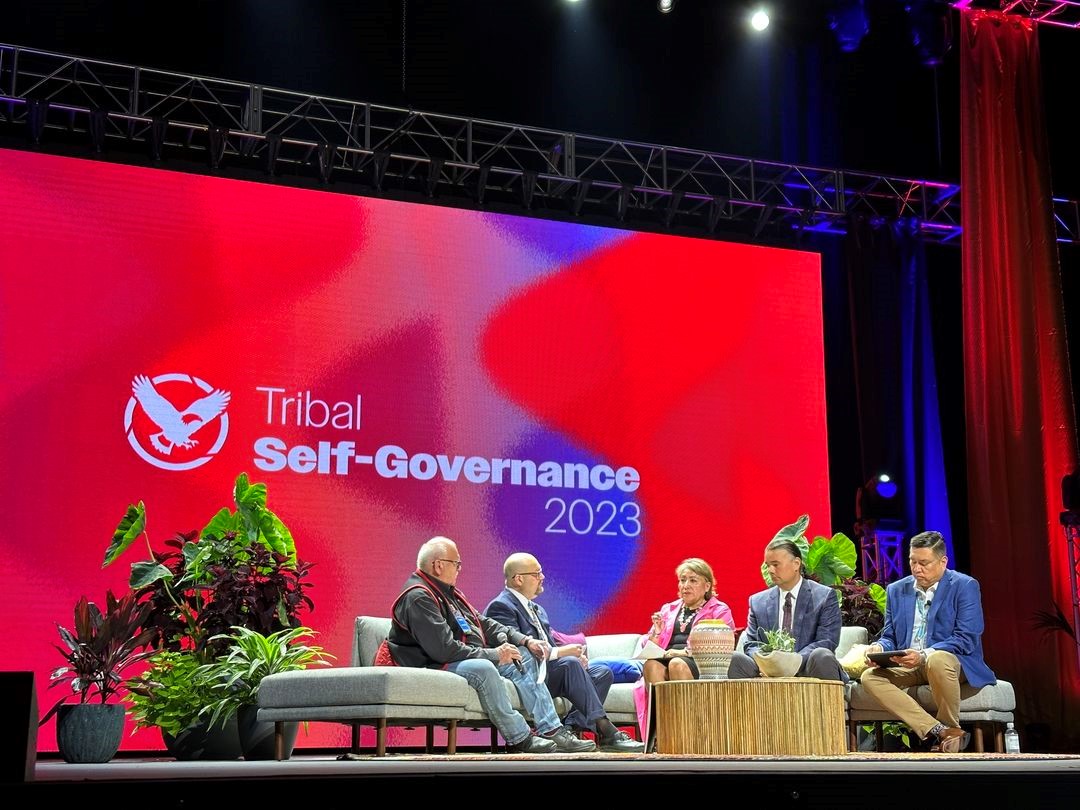
IHS Director Roselyn Tso at the 2023 Tribal Self-Governance Conference in Tulsa, Oklahoma
IHS Leadership Team Site Visits
Director Tso and IHS leadership recently visited the Koweta Indian Health Center in Coweta, Oklahoma, to meet with tribal and health center leaders and discuss the needs and priorities of the Muscogee (Creek) Nation. During the visit, leadership had an opportunity to tour the health care facility and see the tribe's automated pharmaceutical refill center. The IHS is pleased to see how our joint venture has thrived over the years, and looks forward to continued partnership in serving their community.
IHS leadership also met with Oklahoma City Area Director Rear Adm. Travis Watts and his great team at the Oklahoma City Area Office. This was followed by a tour of the National Supply Service Center’s main warehouse and turnkey facilities. Later, IHS met with leaders from the Oklahoma City Indian Clinic to tour the health care facility before ending the day in western Oklahoma to meet with the Cheyenne & Arapaho Tribes and tour the El Reno Indian Health Center.
The IHS leadership team also traveled to Anadarko, Oklahoma, to meet with leaders from the Apache Tribe, Fort Sill Apache, Caddo Nation, Comanche Nation, Kiowa Tribe, Wichita and Affiliated Tribes, Delaware Nation and the Cheyenne and Arapaho Tribes. While in Anadarko, IHS met with leaders at the Anadarko Indian Health Center and Riverside Boarding School to tour each facility. The day ended in Shawnee, Oklahoma, with meetings with Citizen Potawatomi Nation Health Care System leadership.
The IHS values the partnerships with tribes across Oklahoma and Indian Country, as each tribe is a major driver of the Area’s health care infrastructure and delivery of care. Together, we can work to improve and develop quality health systems and healthy communities.
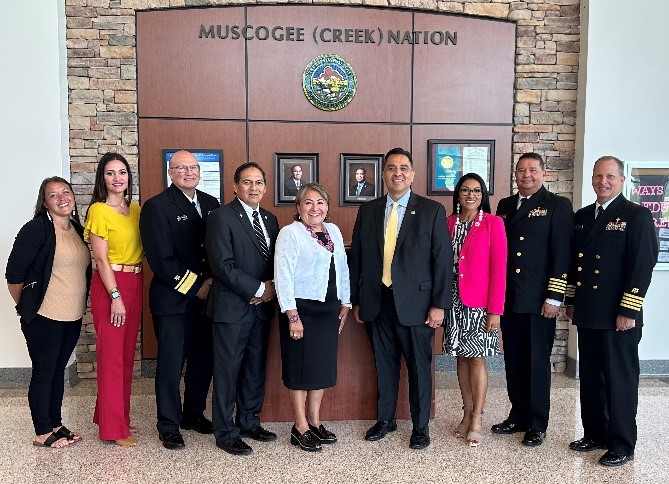
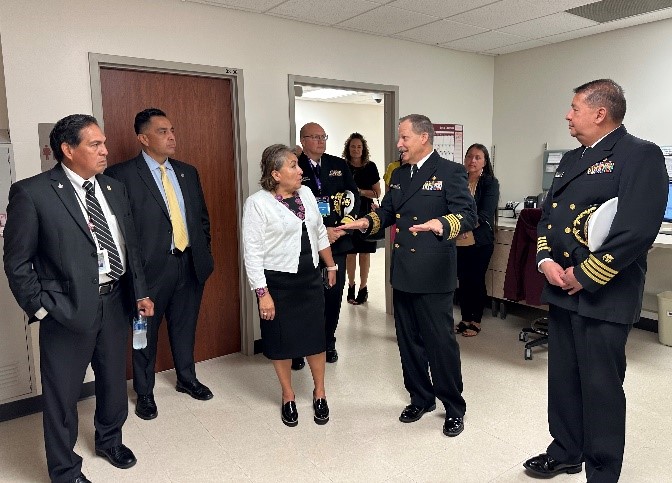
IHS Director Roselyn Tso visits the Muscogee (Creek) Nation's Koweta Indian Health Center
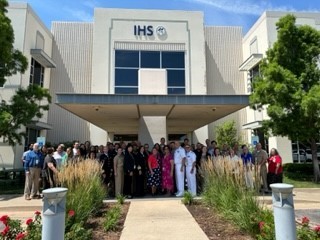
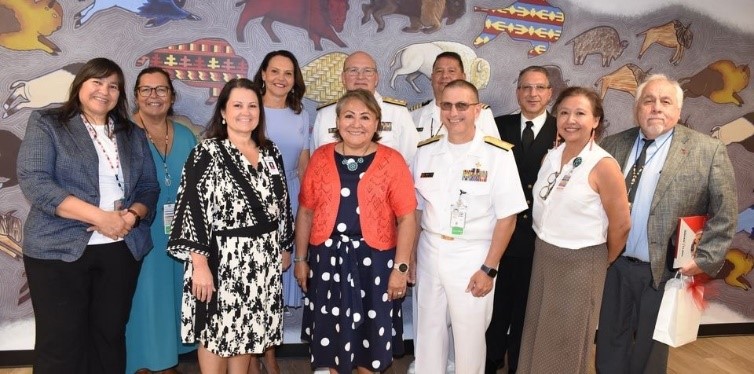
(Photo 1) IHS Director Roselyn Tso visit to the Oklahoma City Indian Clinic (Photo 2) IHS leadership visits the Oklahoma City Area Office
Tribal Delegation Meetings
To create a space for IHS and tribal leadership to directly discuss individual issues or concerns while renewing and strengthening partnerships, the IHS frequently hosts tribal delegation meetings with tribal leaders and tribal organization representatives from across Indian Country. IHS senior leaders recently met with the tribal delegations from the Cherokee Nation, Chickasaw Nation, Choctaw Nation, Colville Confederated Tribes, Hoopa Valley Tribe, Qawalangin Tribe of Unalaska, Kiowa Tribe, Laguna Pueblo, and Squaxin Island Tribe. The IHS would like to extend our appreciation to each tribal leader for their time while attending the Tribal Self-Governance Conference to discuss issues and share successes in delivering health care to tribal members. To see more photos of each meeting, please view the IHS Director Facebook page.
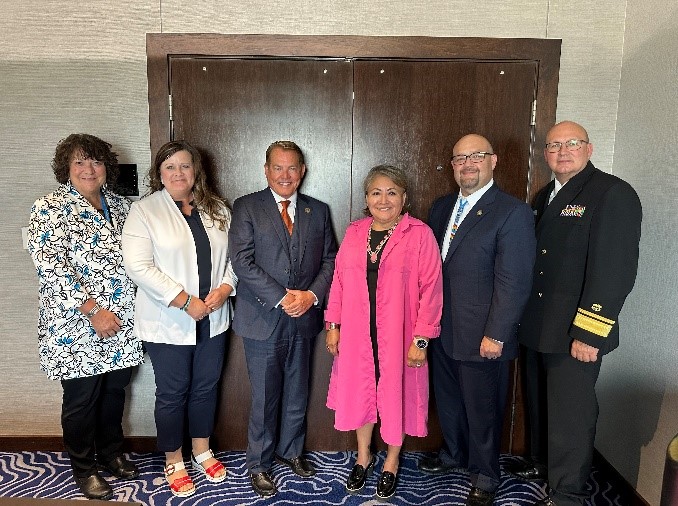
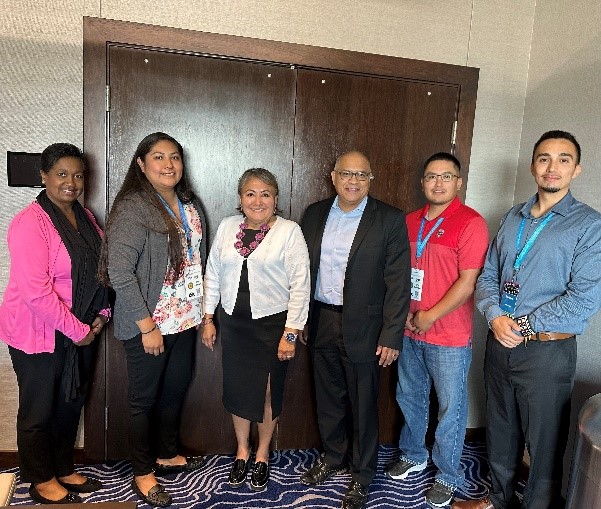
(Photo 1) Meeting with the Chickasaw Nation (Photo 2) Meeting with the Pueblo of Laguna
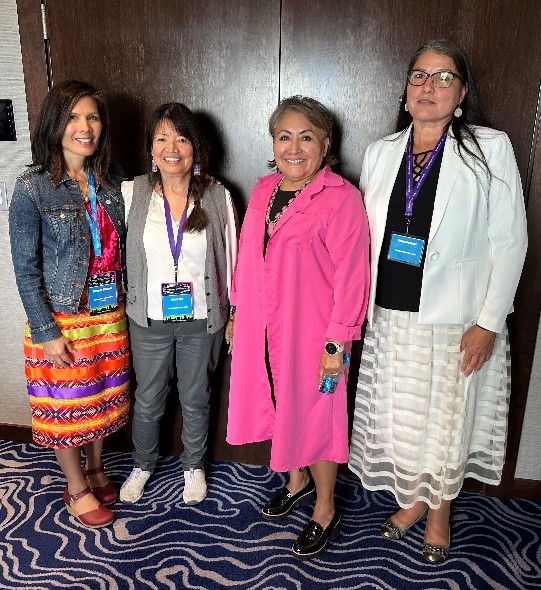
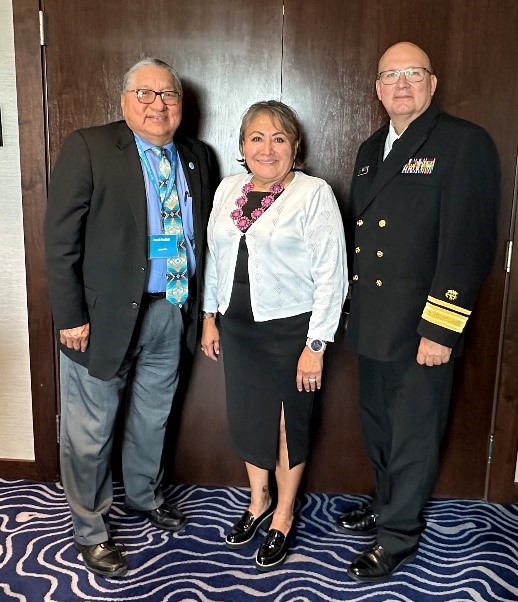
(Photo 1) Meeting with the Colville Confederated Tribes (Photo 2) Meeting with the Kiowa Tribe
U.S. Department of Health and Human Services Annual Regional Tribal Consultations
The IHS has actively been participating in HHS regional tribal consultation sessions with tribal leaders from across Indian Country. Over the past two weeks, Deputy Director for Field Operations Rear Adm. Chris Buchanan joined HHS colleagues for the HHS Region IX Tribal Consultation in Phoenix to consult with federally recognized tribes in the region, which includes the California, Navajo, Phoenix, and Tucson IHS Areas. Deputy Director for Management Operations Darrell LaRoche also represented the IHS during the HHS Region I Tribal Consultation. The sessions are designed to provide tribal leaders with the opportunity to guide the department on improving tribal outreach and coordination and discuss programmatic and policy issues. The IHS provides updates on work we are doing across the Indian health system and outlines how we can provide high-quality health and resource needs in tribal communities. We appreciate the input and guidance from tribal leaders as we work together to improve the health and well-being of our patients, communities, and people.

Deputy Director for Field Operations Rear Adm. Chris Buchanan at the HHS Region IX Tribal Consultation in Phoenix, Arizona
IHS Includes Sexual Orientation and Gender Identity in Electronic Health Records
On June 16, IHS Director Roselyn Tso signed an issuance to the Indian Health Manual, Circular 23-02, “Data Capture of Sexual Orientation and Gender Identity Information,” which aims to provide a standard to capture structured data for sexual orientation and gender identity in the data fields of an IHS patient’s health record. As with any patient data, SO/GI data collected and entered into the electronic health record must be obtained in a manner that is culturally competent and affirming to patients that identify as Two-Spirit, lesbian, gay, bisexual, transgender, or queer/questioning. While the science is not yet perfect and some 2SLGBTQ+ patients inevitably will not self-disclose, asking about sexual orientation and gender identity in clinical settings will improve health outcomes of patients and help advance the understanding of 2SLGBTQ+ health. Asking these questions will alert providers to screen patients for conditions disproportionately affecting 2SLGBTQ+ individuals and provide appropriate preventive health education.
As always, IHS will continue to ensure that patient’s rights to privacy are protected. Patients can voluntarily provide SO/GI-related information for capture in their health records, which includes legal sex, gender identity, preferred name, pronouns, and sexual orientation. Staff who perform patient registration duties will collect the information through an identified local process that may include an Intake Form. Please remember that IHS patients may decline to provide SO/GI information. To learn more, read the IHS blog.
Addressing the Opioid Epidemic in Indian Country through IHS Grants
The Community Opioid Intervention Pilot Project is a pilot grant project established by the Consolidated Appropriations Act of 2019. In Fiscal Year 2019, the IHS received a new appropriation of $10 million to combat the opioid epidemic in Indian Country. The IHS created a pilot project and issued grants to support the development, documentation, and sharing of locally designed and culturally appropriate prevention, treatment, recovery, and aftercare services for opioid misuse and opioid use disorders in American Indian and Alaska Native communities. Through collaborative efforts in building local capacity to mitigate opioid-related risks, the COIPP grant project has positively impacted tribal communities by increasing knowledge about the dangers of opioids and harm reduction activities, creating crisis and support teams, and increasing access to treatment for opioid use disorder. Read the IHS blog or visit the COIPP website for more information.
National Maternal Mental Health Hotline
As of June 23, text services have been restored for the Health Resources & Services Administration National Maternal Mental Health Hotline. The hotline is available via phone and text, with counselors that provide real-time emotional support, encouragement, information and referrals. Pregnant and postpartum women can get the help and resources they need when they need it. Call or text 1-833-TLC-MAMA (1-833-852-6262) to connect with counselors. Learn more about the National Maternal Mental Health Hotline.
Telebehavioral Health Center of Excellence Training
The IHS Telebehavioral Health Center of Excellence Tele-Education Program is hosting the following trainings for health care providers over the next two weeks:
- Child and Adolescent Behavioral Health Webinar Series: Interventions and Supports: Fetal Alcohol Spectrum Disorders (FASD)
July 13 at 1:00 p.m. ET | Register now - Pain and Opioid Use Disorder Webinar Series: A Review of Cannabis and Cannabinoids - Part 1
July 19 at 2:00 p.m. ET | Register now
IHS Division of Diabetes Treatment and Prevention Announcement
The IHS Division of Diabetes Treatment and Prevention: Advancements in Diabetes Webinar Series is hosting the following webinar for health care providers:
- “The Medical Neighborhood” Interprofessional Systems to Improve Diabetes Outcomes
July 12 at 3:00 p.m. ET | Attend the webinar
A NEW IHS Nutrition website for American Indian and Alaska Native people and communities features topics such as:
- Food and Nutrition Security
- Food Sovereignty
- The Produce Prescription Pilot Program
- Nutrition in Life's Vital Stages
To access a variety of free clinical and patient education resources, as well as nutrition-related announcements, visit the new website. For questions or concerns about IHS nutrition-related topics or the website, feel free to contact us.

Save the Date
- July 13: July Tribal and Urban Indian Organizations Call
- July 20: DSTAC Monthly Meeting
- July 27: CHAP Tribal Advisory Group (TAG) Meeting
Latest IHS Blogs
- Addressing the Opioid Epidemic in Indian Country through IHS Grants
- IHS Includes Sexual Orientation and Gender Identity in Electronic Health Records
- Making Improvements in the Management of IHS Programs and Responding to GAO's High Risk List
- Update on Status of COVID-19 Supplemental Appropriations
Other News
Improve Adverse Event Detection Efforts with a New Resource from the HHS-OIG
Yesterday, HHS-OIG released “Adverse Events Toolkits: Medical Record Review Methodology and Clinical Guidance for Identifying Patient Harm,” which can help advance patient safety in hospitals and inpatient settings. These technical resources provide methodological considerations and clinical guidance for identifying and tracking adverse events experienced by patients. The toolkits include a summary of HHS-OIG’s methodological approach to identifying and categorizing patient harm and a set of clinical guidance HHS-OIG used to decide whether events counted as patient harm. These tools are tandem products and may be adapted in part or in whole for use in other medical record review projects. To learn more, visit their webpage.
2022 IHS Annual Health Literacy Awards
The IHS Annual Health Literacy Awards recognize outstanding teams and individuals for their commitment and contributions to advancing health literacy. This year, we are recognizing winners of the Health Literacy Team Champion Award and the Health Literacy Individual Award. For more information, read about how awardees are supporting health literacy in their work. Congratulations to the 2022 IHS Annual Health Literacy Award recipients!
Individual Category:
Violeta M. Pantaleon, RN, Northern Navajo Medical Center, Navajo Area
Team Category:
Opioid Stewardship Program, Mescalero Service Unit, Albuquerque Area
- Lt. Cmdr. Thu Tran
- Pierrette Toussaint, MD
- Michael Shing, DO
- Wally Jean, MD
- Kayt Whitebird-Orange, PhD
- Lt. Michelle Lin
- Opeyemi Komolafe, PharmD
- Cmdr. John Sickman
- Salvador Mercado, MD
Purchased/Referred Care Officers Meeting
IHS Purchased/Referred Care officers recently met in Nashville, Tennessee, to receive updates on agency initiatives, discuss improvements for the PRC systems and review program operations in order to effectively manage the PRC Program. Officers also discussed administrative and financial aspects of the program, the Catastrophic Health Emergency Fund, and planning for the annual IHS Partnership Conference.
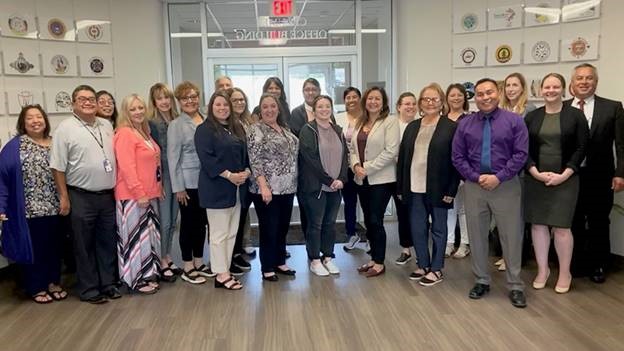
IHS Purchased/Referred Care officers meeting in Nashville, Tennesse


